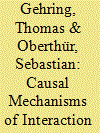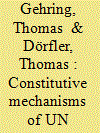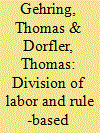| Srl | Item |
| 1 |
ID:
087494


|
|
|
|
|
| Publication |
2009.
|
| Summary/Abstract |
This article develops a conceptual framework for the systematic analysis of the interaction between international institutions as a first step towards building a theory of international interaction. It examines how international institutions may exert causal influence on each other's development and effectiveness and suggests that four general causal mechanisms can elucidate the distinct routes through which influence travels from one institution to another. Institutional interaction can thus rely on transfer of knowledge, commitments established under an institution, behavioural effects of an institution, and functional linkage of the ultimate governance targets of the institutions involved. The article also puts forward hypotheses about the likely effects of specific types of institutional interaction for governance within the international system. The causal mechanisms and types of interaction are mutually exclusive models that help analyse real-world interaction situations. They may also serve as a basis for the systematic analysis of more complex interaction situations.
|
|
|
|
|
|
|
|
|
|
|
|
|
|
|
|
| 2 |
ID:
164439


|
|
|
|
|
| Summary/Abstract |
Based upon the current debate on international practices with its focus on taken-for-granted everyday practices, we examine how Security Council practices may affect member state action and collective decisions on intrastate conflicts. We outline a concept that integrates the structuring effect of practices and their emergence from interaction among reflective actors. It promises to overcome the unresolved tension between understanding practices as a social regularity and as a fluid entity. We analyse the constitutive mechanisms of two Council practices that affect collective decisions on intrastate conflicts and elucidate how even reflective Council members become enmeshed with the constraining implications of evolving practices and their normative implications. (1) Previous Council decisions create precedent pressure and give rise to a virtually uncontested permissive Council practice that defines the purview for intervention into such conflicts. (2) A ratcheting practice forces opponents to choose between accepting steadily reinforced Council action, as occurred regarding Sudan/Darfur, and outright blockade, as in the case of Syria. We conclude that practices constitute a source of influence that is not captured by the traditional perspectives on Council activities as the consequence of geopolitical interests or of externally evolving international norms like the ‘responsibility to protect’ (R2P).
|
|
|
|
|
|
|
|
|
|
|
|
|
|
|
|
| 3 |
ID:
125383


|
|
|
|
|
| Publication |
2013.
|
| Summary/Abstract |
Decisionmaking within the Security Council increasingly involves delegation to subsidiary bodies. Drawing on modern institutional theory, this article examines the effects of the emergent system of divided labor within the al-Qaeda/Taiwan sanction regime. The article first looks at the political economy of the process of listing individuals and private entities as sanctions targets. Second, it explores the distinct functions performed by the bodies of the sanctions regime; namely, the Security Council, the AQT Sanctions Committee, the Office of the Ombudsperson, and an expert body. Third, it analyzes the resulting incentive structures in three successive stage of regime development. The article concludes that the sanctions regime constitutes a surprisingly well-advanced model of how to commit even powerful states to rule based governance without depriving them of their capability to adopt political decision.
|
|
|
|
|
|
|
|
|
|
|
|
|
|
|
|
| 4 |
ID:
117947


|
|
|
|
|
| Publication |
2013.
|
| Summary/Abstract |
This article takes stock of the current debate on regime complexes. The specific relevance of such complexes for global governance is best grasped if these complexes are understood as systems that relate and organize their elemental institutions. They emerge from activities of relevant international actors, in particular the member states of their elemental institutions, as well as from interactions among these institutions. Regime complexes establish interinstitutional competition, which may lead to open conflict and turf battles, but may also produce a well-established division of labor among the elemental institutions. As they provide forum-shopping opportunities for actors, regime complexes put overlapping governance institutions under continuing competitive pressure and they do not necessarily predominantly benefit the most powerful states. In order to increase the coherence and effectiveness of global governance efforts, the management of regime complexes will become an increasingly important task of global governance.
|
|
|
|
|
|
|
|
|
|
|
|
|
|
|
|